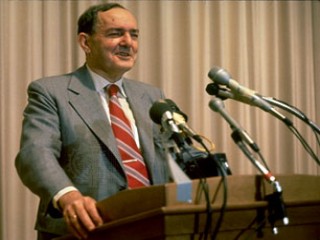
Herbert Alexander Simon biography
Date of birth : 1916-06-15
Date of death : 2001-02-09
Birthplace : Milwaukee, Wisconsin, U.S.
Nationality : American
Category : Science and Technology
Last modified : 2011-06-09
Credited as : Political scientist, economist, sociologist
Herbert Alexander Simon was born in Milwaukee, Wisconsin, on June 15, 1916. He received an A.B. from the University of Chicago in 1936 and a Ph.D. in 1943. He stayed on at Chicago for two years as a research assistant before becoming a staff member of the International City Managers Association and assistant editor of the Public Management and Municipal Year Book (1938-1939). The following year he joined the University of California as director of administrative measurement studies. After a teaching post at the Illinois Institute of Technology (1942-1949), Simon joined the teaching staff of the Carnegie-Mellon University, first as professor of administration and psychology (1949-1955) and later as professor of computer science and psychology (1956 to the mid-1980s).
In his work Simon brought greater realism to neoclassical economic models, which he found to be lacking because of their idealized vision of the "rational" consumer, businessperson, or worker. Instead of maximizing their welfare, profits, or wages on the marketplace, Simon believed that lack of information about alternatives and the impossibility of foreseeing the future makes all of these participants "satisficers." Their rational behavior is "bounded" by the cost of obtaining information and uncertainty; hence Simon proposed the concept of "bounded rationality." That is, economic agents try to do as well as possible given the constraints, but these constraints keep them from ever achieving what neo-classical economists would call a "maximum" (of profits, for example). Simon argues that individuals would be acting rationally by "satisficing," given real world circumstances.
The notion of "bounded rationality" is explained by analogy to the search for a needle in the haystack. The neoclassical approach would be to search for the needle in the stack (a maximization process). Simon's approach is to find the needle which is sharp enough to handle the contemplated sewing tasks (a "satisficing" process).
In another example, consider a chess game: every move involves potentially millions of calculations about alternative actions. Since it is impossible for players to examine all the possibilities, they learn to follow promising lines of play and to utilize "rules of thumb" in decision-making. Over time these rules of thumb change as outcomes are evaluated.
Simon's views on rationality have been expounded in numerous books and articles, including Models of Man (1956), Human Problem Solving (with Allen Newell, 1972), The Sciences of the Artificial (1969), Models of Discovery (1977), and Models of Bounded Rationality and Other Topics in Economic Theory (1982).
Simon also disputes whether economic models centered on "equilibrium" solutions are useful or accurate. The idea of equilibrium derives from the science of mechanics and was adapted to economic problems by neo-classical economists of the late 19th century. Most modern American economists until the mid-1970s also utilized this methodology. Simon, in his Richard T. Ely Lecture to the American Economic Association in 1978, argued that: "when the system is complex and its environment continually changing (that is, in the conditions under which biological and social evolution actually takes place), there is no assurance that the system's momentary position will lie anywhere near a point of equilibrium."
Simon made other significant contributions to economic analysis. The Hawkins-Simon theorem (1949) contains a powerful test for the sustainability of an economy as measured by input-output tables. In the area of production scheduling Simon co-authored the "Certainty Equivalent" theorem (1956, 1960), which provided practical help to businesses concerned with the needs for labor and inventory when demand fluctuates.
In spite of his own mathematical prowess, Simon sought to break economic methodology out of the rigorous mathematical modeling which requires strong assumptions and quantifiable data into a broader arena of qualitative analysis using interdisciplinary theories. Indeed, he believed economists have much to learn from other social sciences and in his own career he drew widely from them. Much of his writing dealt with issues in psychology as applied to organizations, or what Simon called "micro-micro-economics." To promote these views Simon, along with colleagues at Carnegie-Mellon, founded The Journal of Organizational Behavior. Simon's textbook Administrative Behavior was first published in 1947 and became a classic in the field, going through several editions.
Simon was a consultant to the International City Managers Association (1942-1949), the U.S. Bureau of the Budget (1946-1949), the U.S. Census Bureau (1947), and the Cowles Commission for Research in Economics (1947-1960); chairman of the board of directors of the Social Science Research Council (1961-1965); member of the President's Scientific Advisory Committee (1969-1971); chairman of the Committee on Air Quality Control of the National Academy of Sciences (1974); chairman of the Committee on Behavioral Sciences of the National Science Foundation; winner of the Award for Distinguished Scientific Contributions of the American Psychological Association (1969), and Distinguished Fellow of the American Economic Association (1976). He lectured extensively around the world and received nine honorary degrees.
For his many and diverse contributions Herbert Simon was awarded the Alfred Nobel Memorial Prize in Economics in 1978. Yet the label "economist" is far too narrow for this extraordinary social scientist and philosopher. While not a household name, Simon is still widely-read and has had a profound influence on the underpinnings of nearly every social science. Often referenced in both the abstract as well as the specific, some of Simon's views were discussed in 1996 by Herbert Kaufman in his acceptance of the Dwight Waldo Award of the American Society for Public Administration (ASPA), of which Simon is a previous recipient.
















